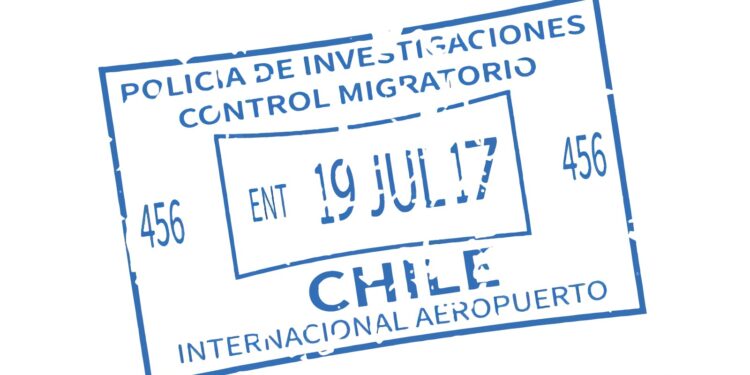Business Aircraft Ops to Chile: CIQ Clearance

This is a post by author Mariana Tsymbalista. Mariana is the FBO Assistant at Aviasur, a Universal Aviation® Certified ground handler, which has an FBO in Santiago, Chile and provides ground support throughout the country. Mariana is an expert on business aircraft operations in Chile and can be contacted at marianatsymbalista@univ-wea.com.
This business aviation blog post is part of a series on operating to Chile and continues from our last article: “Business Aircraft Ops to Chile: Ground Handling & Additional Services.“
Customs, immigration, and quarantine (CIQ) clearance in Chile either takes place within a fixed-base operator (FBO) or at a main terminal, depending upon your airport of entry. It’s important to note that clearance requirements differ when you have more than 19 passengers onboard.
The following is an overview of what you need to know:
1. Clearing CIQ
CIQ clearance in Chile is not possible onboard the aircraft under any circumstances. In the case of Santiago (SCEL), all general aviation (GA) clearance is done within the FBO, unless you have more than 19 passengers onboard. For operations with more than 19 passengers CIQ is cleared in the main terminal, using a separate line from scheduled commercial passengers. Your ground handler will escort you through the process. FBO clearance takes about 15 minutes while main terminal clearance involves about 30 minutes. All luggage is checked upon arrival, but this process generally takes longer when done within the main terminal. At airports other than SCEL, CIQ clearance is generally via the main terminal, using a separate line from scheduled commercial passenger clearance.
2. Declaration, passport and visa requirements
All crew and passengers arriving in Chile need to fill out customs declarations. Your ground handler will assist in pre-filling out these forms so that all you’ll need to do upon arrival is sign the document. Note that passports must be valid for your intended length of stay. Visas must be obtained prior to arrival for certain nationalities of passengers, but crew do not need visas regardless of nationality. If a passenger arrives without a required visa it’s at discretion of immigration authorities to permit the passenger into the country or not. In some cases you may be permitted into the country on the condition that a visa or travel authority be obtained from a local embassy or consulate.
3. Agriculture and health considerations
Customs and agriculture inspectors are present for all international flight arrives. As soon as aircraft doors open they’ll begin their process of inspecting the aircraft. Agriculture officials in Chile always need to confirm that your aircraft has been disinfected for any international arrival. If this has not been done at top of descent via insecticide, arrangements will be made to disinfect the aircraft on the ground. Agricultural officials will also remove all meat and fresh produce for disposal. Certain catering items are permitted to be brought into Chile, but it’s important to confirm this prior to arrival. Permitted catering items may be stored at the airport, or you may take them with you to your hotel.
4. Departure clearance
Departure clearance in Chile is a similar process to arrival clearance except that agriculture officials are not present. Your ground handler will notify CIQ 24 hours prior to your departure and all luggage will be inspected pre-departure.
5. Pets and weapons
Agriculture officials oversee any pets you may be temporarily importing into the country. If you plan to arrive in Chile with a pet, vaccination and health certificate details should be forwarded to your ground handler in advance, so that the agriculture department can be notified.
It’s possible to bring weapons into the country for a maximum of up to 90 days, but there are specific steps you’ll need to take in order to secure this approval. You must send in advance weapon serial numbers and ammunition details along with licenses and owner details. Customs authorities will review this to determine if the weapons will be permitted into the country and/or if any additional documentation is needed.
6. Payment of reciprocity fees
Chile requires payment of reciprocity fees for all nationals arriving from Albania, Australia, Canada, and Mexico. Once this reciprocity fee is paid it does not need to be paid again as long as the passport is valid. However, the exception to this is that Mexican nationals must pay reciprocity fees each time they enter Chile. If any reciprocity fees need to be paid upon arrival, your ground handler will take the passenger passport to the main terminal, pay the fee on your behalf, and return the passport prior to the passenger clearing CIQ.
7. Additional reading: Business Aircraft Ops to Chile – Series Index
Note: Links will be updated as articles are published.
- Part 1 – airport operations
- Part 2 – ground handling
- Part 3 – customs, immigration and quarantine
- Part 4 – airport slots and permits
- Part 5 – aviation fuel and security
- Part 6 – flight planning and weather
- Part 7 – additional operating considerations
Conclusion
When traveling to Chile with pets or weapons onboard it’s best to be proactive in advising your ground handler of all relevant details in advance. It’s very important to be aware of all applicable regulations and requirements in terms of pets, weapons and catering that you’d like to retain for the next flight leg. Also, there are reciprocity fees for certain nationals, so it’s best to advise them in advance what the process will be on arrival.
Later, we’ll discuss airport slots and permits for Chile and their impact on your trip.
Questions?
If you have any questions about this article or would like assistance planning your next trip to Chile, contact me at marianatsymbalista@univ-wea.com.




